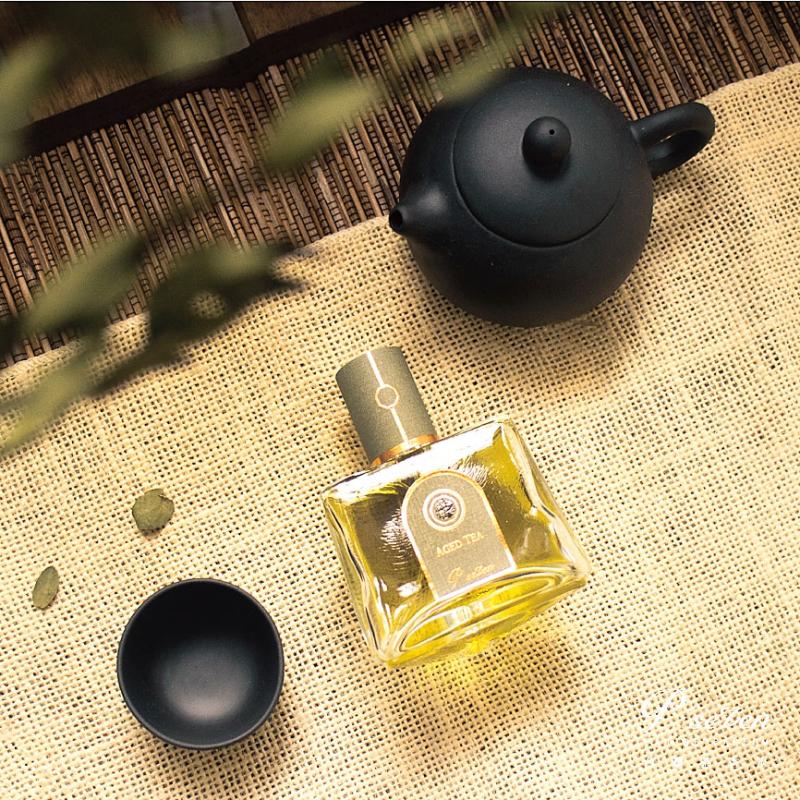A Taiwanese-made tea-based perfume won the Independent Award at the Art and Olfaction Awards (A+OA) in Miami, Florida, on Friday.
Pan Seven International’s (P.Seven) Aged Tea (暗香), designed by perfumers Pan Yu-ching (潘雨晴) and Huang Chien-shun (黃建勳), is the first Taiwanese entry to win the awards’ “Golden Pear” trophy.
The preliminary round of the competition is judged blindly, focusing solely on the scent of the perfume, after which the names and brands of the short-listed finalists are revealed, the Web site of the Los Angeles-based A+OA says.

Photo courtesy of P.Seven
The winning perfume, created by Pan, stood out in a world dominated by European and US brands.
Pan said that her creations mostly feature fresh and elegant aromas of tea leaves, which are different from European perfumes with floral or citrus aromas that are most well-known.
A former tea master, Pan said that she took up perfumery and founded P.Seven a decade ago, adding that the brand’s first product, Taiwanese Tea, was inspired by Taiwan’s “spring tea.”
While designing the perfume for the competition, Pan said that she decided to use Taiwanese aged tea as a theme to showcase Taiwan through her creation, as many people learn about Taiwan through its tea such as its famous oolong tea and oriental beauty tea.
Aged tea, which has been stored for years or even decades, has a strong aroma with slight notes of smoked plums, fruits and herbs, a blend unique to Taiwan, she said, adding that she recreated this fragrance using mostly Taiwanese produce.
With a woody and smoky base, Aged Tea gives off the elegant fragrance of aged Taiwanese tea, which is accompanied by the scent of smoked plum and the sweetness of longan, she added.
Upon learning the news of the win, Pan said that it felt “incredible,” adding that she was happy to bring Taiwan to the world, as she has always wanted to give back to her country.
P.Seven has held aroma exhibitions in Japan, Hong Kong and Shanghai, but was unable to do so in the past two years due to the COVID-19 pandemic, she said.
She has returned to her hometown, Hualien County’s Fuli Township (富里), and launched an art festival, inviting more than 20 artists-in-residence to create works of art related to the area.
She has also drawn inspiration from her hometown to create two fragrances — one that smells like rice fields and another that smells like bamboo forests — in cooperation with the Fuli Farmers’ Association and the Forestry Bureau’s office in Hualien respectively.
Aged Tea was not the only tea-based perfume recognized this year, with Oolong Tea by Hong Kong perfumer Michael Wong winning the Artisan Award.
Another notable Golden Pear winner was Viral Parfum by the Japanese olfactory artist Maki Ueda, which won the Sadakichi Award For Experimental Work With Scent.
The fragrance “uses six scent accords to represent the different mutations of” COVID-19, which together create an aroma of white lily and are only visible under black light, the A+OA said in a statement.
The Institute for Art and Olfaction, founded in 2013, launched the annual A+OA in 2014, hoping to “help generate support for independent practices in perfumery,” its Web site says.
Additional reporting by CNA

An essay competition jointly organized by a local writing society and a publisher affiliated with the Chinese Communist Party (CCP) might have contravened the Act Governing Relations Between the People of the Taiwan Area and the Mainland Area (臺灣地區與大陸地區人民關係條例), the Mainland Affairs Council (MAC) said on Thursday. “In this case, the partner organization is clearly an agency under the CCP’s Fujian Provincial Committee,” MAC Deputy Minister and spokesperson Liang Wen-chieh (梁文傑) said at a news briefing in Taipei. “It also involves bringing Taiwanese students to China with all-expenses-paid arrangements to attend award ceremonies and camps,” Liang said. Those two “characteristics” are typically sufficient

A magnitude 5.9 earthquake that struck about 33km off the coast of Hualien City was the "main shock" in a series of quakes in the area, with aftershocks expected over the next three days, the Central Weather Administration (CWA) said yesterday. Prior to the magnitude 5.9 quake shaking most of Taiwan at 6:53pm yesterday, six other earthquakes stronger than a magnitude of 4, starting with a magnitude 5.5 quake at 6:09pm, occurred in the area. CWA Seismological Center Director Wu Chien-fu (吳健富) confirmed that the quakes were all part of the same series and that the magnitude 5.5 temblor was

The brilliant blue waters, thick foliage and bucolic atmosphere on this seemingly idyllic archipelago deep in the Pacific Ocean belie the key role it now plays in a titanic geopolitical struggle. Palau is again on the front line as China, and the US and its allies prepare their forces in an intensifying contest for control over the Asia-Pacific region. The democratic nation of just 17,000 people hosts US-controlled airstrips and soon-to-be-completed radar installations that the US military describes as “critical” to monitoring vast swathes of water and airspace. It is also a key piece of the second island chain, a string of

The Central Weather Administration has issued a heat alert for southeastern Taiwan, warning of temperatures as high as 36°C today, while alerting some coastal areas of strong winds later in the day. Kaohsiung’s Neimen District (內門) and Pingtung County’s Neipu Township (內埔) are under an orange heat alert, which warns of temperatures as high as 36°C for three consecutive days, the CWA said, citing southwest winds. The heat would also extend to Tainan’s Nansi (楠西) and Yujing (玉井) districts, as well as Pingtung’s Gaoshu (高樹), Yanpu (鹽埔) and Majia (瑪家) townships, it said, forecasting highs of up to 36°C in those areas